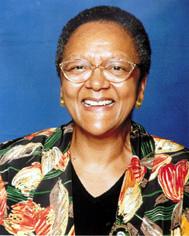Barbara Masekela (ANC Activist)
 Barbara Masekela was born on 18 July 1941 in Johannesburg. She completed her primary education at St. Michael's Anglican School inAlexandra township. Later she attended Inanda Girls Seminary between 1956 and1960, where she was exposed to leading lights of the African National Congress (ANC) such as Chief Albert Luthuli and MB Yengwa, who were some of the distinguished invited speakers tothe girls’ college.
Barbara Masekela was born on 18 July 1941 in Johannesburg. She completed her primary education at St. Michael's Anglican School inAlexandra township. Later she attended Inanda Girls Seminary between 1956 and1960, where she was exposed to leading lights of the African National Congress (ANC) such as Chief Albert Luthuli and MB Yengwa, who were some of the distinguished invited speakers tothe girls’ college.
Here, she also came into contact with Johnny Makatini, a leading ANC activist who recruited her into the ANC and became her mentor. After matriculation, Barbara worked in a textile factory in Johannesburg and through a family friend found employment in the subscriptiondepartment of New Age.
Her supervisor was Wolfie Kodesh and here she was introduced to activists of the ANC Youth League, the South African Communist Party and the ANC. In 1962, she attended Roma University in Lesotho and subsequently left South Africa in 1963 togo to Ghana.
She left New York to work full-time for the ANC in 1982. Here, she was charged with establishing the ANC Department of Arts and Culture,which proceeded to debate and develop policy, including the strengthening of the Cultural, Sports and Diplomatic Boycott to exclude theapartheid regime; to manage the Amandla Cultural Ensemble as well as other developmental and promotional cultural ANC projects,including post-apartheid cultural policies.
As part of the cultural collective of the ANC, Masekela organised various anti-apartheid conferences and cultural festivals, including the "Culture in Another South Africa" festival, which took place at the end of 1987, in Amsterdam. The festival entailed a series of exhibitionsand performances in Amsterdam's major theatres, presented by 200 South African photographers, fashion designers, actors and musi-cians. It was a significant example of the uninterrupted line of unity among South Africans at home and abroad and included the call forthe release of political prisoners, some of whom had been sentenced to death by the apartheid regime.
In 1990, after the unbanning of the ANC, Masekela moved to the ANC’s fund-raising department and later became Nelson Mandela’s chiefof staff, until 1995. She served as a member of the ANC’s National Executive Committee, from 1991 to 1994.
In 1995, she became South Africa’s official ambassador to the United Nations Educational, Scientific and Cultural Organisation and servedas the democratic South Africa’s first ambassador to France from 1995 to 1998. Masekela was appointed as ambassador to the USA from2003 to 2007.
Masekela served as deputy chairperson of the SABC from 1999 to 2003 and chaired the Board Subcommittee on Programming andLanguage. She serves on the Advisory Board of the Nelson Mandela Foundation and the Nelson Mandela Children’s Fund.
Barbara Masekela has overcome the gender limitations of her era to become a robust intellectual with a fiercely independent mind anduncompromising position against the apartheid system. She has proved to be quite an outstanding manager, organiser, campaigner anddiplomat.
Barbara Masekela is also a poet and is presently writing her memoirs.
Related Links:
Barbara Masekela on The Presidency - South Africa